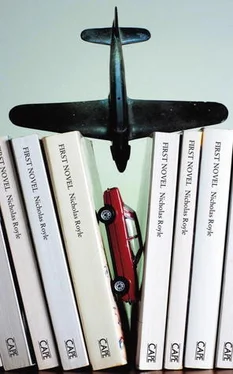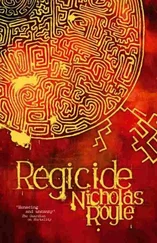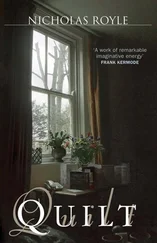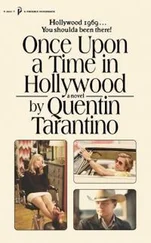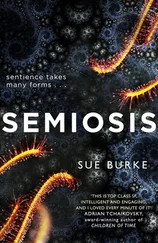‘I’m sorry, Jonny. I’m sorry.’
They waited downstairs and Nicholas didn’t call anyone. He found something for Jonny to play with while he listened for the sound of the front gate. Instead, what he heard was the scrunch of tyres on gravel. He went to the door to see his grandad climbing effortfully out of the car.
‘I went to fetch you,’ Grandad said.
‘I’m sorry, Grandad. You must have just missed us. We walked. Grandad?’
Grandad stopped and looked at Nicholas.
‘Come inside.’
‘What is it? What have you got to tell me?’
Nicholas took his grandad into the front room and told him what they had found. The old man’s face crumpled, his features disappearing, and Nicholas saw tears sprouting from rhinoceros-like folds of skin. He placed an awkward hand on his grandad’s shoulder.
‘We need to call someone,’ Nicholas said. ‘I don’t know who to call.’ And as he said this he remembered the man they had seen leaving the house.
‘We need to call the GP, Dr Shipman,’ Grandad said.
‘If you give me his number I’ll call him.’
Within twenty minutes, a car could be heard pulling up outside the house. Nicholas looked out of the window. The same man was walking up the garden path as they had seen leaving the house on their arrival. Nicholas went to open the door. The man looked surprised to see him, but merely muttered something unintelligible and insinuated his bag into the space between Nicholas and the door jamb in order to gain entry. Nicholas watched the doctor’s back as he walked upstairs, then went into the front room to wait with Grandad.
Eventually, they heard the doctor making his way downstairs. Nicholas went to open the door and the doctor entered the front room. Grandad tried to stand, but Nicholas went over to him and encouraged him to stay seated.
‘She was all right when I left her earlier,’ the doctor said, as if it were merely annoying that the timing was awry.
Grandad frowned.
‘The doctor was here earlier,’ Nicholas explained. ‘He was just leaving when we arrived.’
‘Her heart gave out,’ the doctor said, scratching his chin through his scruff of white beard.
‘Her heart gave out? She was fine. She was perfectly fit and well,’ Grandad said.
‘How can her heart just give out?’ Nicholas asked.
‘She was eighty-odd.’
‘Eighty-six. Just,’ Nicholas said, profoundly irritated by the doctor’s manner.
‘We all have to go sometime,’ he said.
‘What?’ Nicholas shouted. ‘Is that the best you can do? We all have to go sometime? ’
The doctor’s face twisted into a self-pitying grimace.
‘I’ll be in touch,’ he muttered.
He turned to go but the doorway was blocked. Jonny was standing there.
Jonny said: ‘When’s Nana going to wake up? Daddy? Daddy? Why won’t Nana wake up?’
There is silence when Grace finishes. She keeps her head down, so it isn’t immediately clear that she has indeed finished. Also, because she read for so long, much longer than one would normally read during such an exercise, many of those around the table got so used to the sound of her deep, cracked voice, even became mesmerised by it, that they were no longer waiting for it to stop.
But then someone claps and another person follows and soon the whole room is applauding. Finally she looks up — at me. I look away and smile at those faces around the table that are turning towards mine. Slowly the clapping dies down.
‘Quite a substantial piece,’ I say. ‘Hardly half an hour’s work.’
‘What was your object, Grace?’ someone asks.
Resting one of her elbows on the tabletop and picking at her lip with her fingers, she looks at me again.
‘My object was Paul,’ she says. ‘And you’re right, Paul. I didn’t write all of that this morning. But you are my inspiration. There’s no question about that.’
There’s a pause while people take this in, each interpreting it, presumably, in their own way.
‘I don’t know what to say,’ I say, reaching for a smile and not quite getting there. ‘Does anyone have a question?’
Lawrence Duncan — or Duncan Lawrence — signals that he wishes to speak. I give him a nod.
‘I’m just kind of like playing devil’s avocado here, dude,’ he says to Grace, ‘but what you’ve done there, mixing up the real and the fictional, you know, bringing a real person into your novel, is that OK? How does that play? I mean, in terms of, like, taste?’
‘You mean, is it in bad taste?’ With the fingers of one hand she is still picking at dry skin on her lower lip.
‘I guess.’
‘I don’t think so, because it really happened.’
‘Right.’ He nods, and then his eyes grow wide. ‘Really? Shit.’
‘Yeah, really.’
‘You mean it really happened to someone you know?’
Lawrence Duncan — or Duncan Lawrence — is like a man trying to keep hold of a bar of soap. Grace, meanwhile, appears to be carefully considering her answer.
‘Yes,’ she says. ‘It happened to someone I know.’
There is an interesting discussion to be had here about morality and taste, but I’m not about to encourage it. Plus, there are a lot of people with pieces to read and only a limited amount of time. I suggest we move on. I notice that Grace finally removes her fingers from her mouth and as her hand returns to the tabletop it is shaking.
After lunch, I get through the first two tutorials on autopilot. I dish out my standard advice. Carry a notebook. Read your work out loud. Go for long walks .
The third slot — the last one of the day — is Helen’s. She comes to find me — I’m sitting outside staring at the far side of the valley — and says, ‘I’ve got to get out of here.’
‘Good idea,’ I say, getting to my feet. ‘Where do you want to go?’
‘Let’s go for a drive,’ she says.
‘Er, OK,’ I say, shooting her a glance, to which she responds with a breezy smile.
I unlock the car as we approach it and she jumps in. I reverse out of the cobbled area in front of the house and drive slowly up the steep lane in first gear.
‘Where shall we go?’ I ask when we reach the road.
‘Which way are you familiar with?’ she asks.
‘That way,’ I say, pointing to the right.
‘Go left then.’
I go left.
‘So shall I just drive?’ I ask after a couple of minutes of listening to the rushing sound of the tyres on the road.
‘Whatever you like,’ she says, playing with her ponytail. ‘You can do whatever you like .’
I turn to look at her. She gives me a lopsided smile.
When I see a turning, I take it, and when I see another I take that as well. Five minutes later we are parked in a field, tucked in behind a hedge. I switch off the engine and release my seat belt. I barely have time to register the sound of birdsong from the hedgerow before Helen climbs across and straddles my lap, hitching up her skirt. I put my hands up to the back of her head. I release her hair from the bobble that she uses for the ponytail and she shakes her head, laughing, so that her hair goes everywhere. I have never seen her with her hair down before. There suddenly seems so much of it. She places her mouth against mine. Our teeth clash. Her mouth tastes citrusy. I can hear the birds singing. I trace the outline of her breast through her cotton top. She leans into me with her hips and runs a hand under my T-shirt, over the small soft mound of my stomach. Her other hand goes to my belt. I lift her top at the back so I can undo her bra. With a shrugging motion, she removes this from her sleeve and I stroke her breasts through the top and then underneath the top and she undoes my jeans and I press back in my seat until I can push them down and she helps me and I remember the last time I parked my car in a field and she kisses me harder and her teeth catch my upper lip and I taste blood and I hear birdsong and she removes her top and her breasts rise and fall in front of my face and she presses them into my face and there’s blood on her breast and the sound of birdsong is constant and I now know what sound it was I could hear that time above the low growl of the engine and the chug of the exhaust and the increasingly faint protests of the children. That sound that I couldn’t put a name to at that time. A sound that should be beautiful both in itself and by association. It’s not, though, it’s not for me. But then nothing is. Nothing is beautiful. Nothing makes me feel anything. Everything either exists or it doesn’t. Everything either has a physical presence or it doesn’t. Everything — everyone — is either alive or dead. And that’s about all I can say.
Читать дальше
